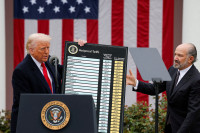World
Germany seeks to levy 10 percent tax on online platforms like Google
Germany’s ruling parties agreed in a coalition deal earlier this year to impose such a digital services levy.
Reuters
Germany is considering a 10 percent tax on large online platforms like Alphabet’s Google (GOOGL.O) and Meta’s Facebook (META.O), its new culture minister told magazine Stern, in a move likely to heighten trade tensions with the Trump administration.
The proposal comes as Chancellor Friedrich Merz is expected to travel to Washington soon to meet with US President Donald Trump, although a trip has not yet been officially announced. Trump has in the past said he will not allow foreign governments to "appropriate America's tax base for their own benefit".
Culture Minister Wolfram Weimer said his ministry was drafting a legislative proposal while also seeking talks with platform operators that he accused of "cunning tax evasion" to explore alternative solutions like voluntary contributions.
"These corporations do billions in business in Germany with extremely high profit margins and benefit enormously from the country’s media and cultural output as well as its infrastructure — but they pay hardly any taxes, invest too little, and give far too little back to society," he told Stern in an interview published on Thursday.
Alphabet and Meta did not immediately respond to Reuters requests for comment.
Germany's ruling parties agreed in a coalition deal earlier this year to impose such a digital services levy.
If the government goes ahead with the tax on sales revenue generated by digital services providers within its borders, it would join a raft of other countries to have done so such as Britain, France, Italy, Spain, Turkey, India, Austria and Canada.
During Trump's first term, the US Trade Representative's office launched a Section 301 investigation into unfair trade practices against several of these countries, finding they discriminated against US companies, paving the way for retaliatory tariffs on certain imports.
In February, Trump ordered his trade chief to revive investigations aimed at imposing tariffs on imports from countries that levy digital service taxes on US technology companies.
That does not, however, appear to have deterred the new German government, which took office earlier this month.
Weimer accused the big digital platforms of building up "monopoly-like structures" that not only restrict competition but also concentrate media power too heavily", posing a risk for freedom of expression.
"If Google, under pressure from Donald Trump, unilaterally renames the Gulf of Mexico to the Gulf of America— and simply decrees this due to its enormous power to shape meaning in global communication — then we can see the kinds of problems that lie within the current structures," he said.




 19.83°C Kathmandu
19.83°C Kathmandu














